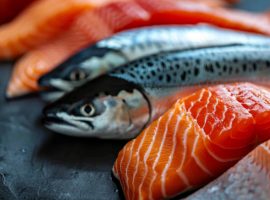Selecting the Right Fish for Your Dog’s Health

When it comes to enhancing your dog’s diet with fish, choosing the right type is paramount for their health and well-being. At Frozen Fish Direct, we understand that the nutritional benefits fish offer can significantly improve your furry friend’s quality of life.
Nutritional Benefits of Fish for Canine Diets
Fish is a powerhouse of nutrition for dogs, providing high-quality protein, essential omega-3 fatty acids, and a variety of vitamins and minerals. These nutrients are crucial for maintaining cognitive function, heart health, and a lustrous coat. Moreover, the anti-inflammatory properties of omega-3s can aid in alleviating joint discomfort, making fish an excellent dietary addition for dogs of all ages.
Ensuring a Healthy Fish Consumption
As you consider incorporating fish into your dog’s diet, it’s important to focus on types that are safe and beneficial. We recommend cooked salmon, cod, and boneless sardines as they are low in mercury and rich in essential nutrients. However, it’s essential to avoid fish that are high in mercury or those that may contain harmful parasites, such as raw salmon or trout.
Tailoring Fish Selection to Your Dog’s Needs
At Frozen Fish Direct, we advise moderation in serving sizes and frequency of fish in your dog’s diet. An ounce of fish per 10 pounds of body weight, served 2-3 times weekly, is a good rule of thumb. Always consult with your veterinarian before introducing new foods to ensure it aligns with your dog’s specific dietary needs, especially if they have underlying health conditions.
Optimal Fish Choices for Canine Health

When considering the best fish for your dog’s nutrition, it’s essential to focus on those that offer the highest benefits while ensuring safety. At Frozen Fish Direct, we recommend a variety of fish that are rich in nutrients and safe for canine consumption.
Nutrient-Rich Fish for Dogs
The most beneficial fish for dogs include cooked salmon, which is high in omega-3 fatty acids and supports immune health, and lean fish like cod, which provides a high-protein, low-fat diet option. Sardines, packed in water without bones, offer calcium and phosphorus, while flounder and trout are excellent choices for their omega-3 content and lean protein.
Omega-3 Fatty Acids and Canine Health
Omega-3 fatty acids, particularly EPA and DHA, are crucial for your dog’s health, contributing to cognitive function, heart health, and reducing inflammation. These fatty acids are also known for improving the condition of your dog’s coat, skin, and joints.
Portion Control Based on Size
We advise that the serving size of fish for dogs should be approximately 1 ounce per 10 pounds of body weight, served 2-3 times weekly. This ensures that your dog reaps the benefits of fish without the risk of overfeeding.
Fish’s Role in Managing Health Issues
Incorporating the right fish into your dog’s diet can aid in managing common health issues such as allergies, obesity, and joint problems. Fish provides a novel protein source that can help mitigate allergic reactions, while the low saturated fat content supports weight management.
Discerning Safe and Risky Fish for Canine Diets

As a responsible pet owner, it’s crucial to know which fish are beneficial for your dog and which could pose health risks. At Frozen Fish Direct, we prioritize your dog’s health by guiding you through the selection of safe and nutritious fish.
Safe Fish Varieties for Your Dog
For your dog’s safety and health, opt for fish that are low in mercury and free from bones. Safe choices include:
- Cooked Salmon: Ensure it’s fully cooked to avoid parasites.
- Cod: A lean option that’s low in fat and high in protein.
- Sardines: Choose boneless and packed in water for essential nutrients without the risk.
- Trout: Another excellent source of omega-3 fatty acids, but always cooked.
Fish to Exclude from Your Dog’s Diet
Avoid fish that could harm your dog, such as:
- High-Mercury Fish: Such as swordfish and some types of mackerel.
- Raw Salmon and Trout: Which can carry parasites leading to salmon poisoning disease.
- Farmed Fish: Often contain unwanted antibiotics and dyes.
Preparing Fish Safely for Canine Consumption
Proper preparation is key to ensuring fish is safe for dogs:
- Cook Thoroughly: To eliminate harmful bacteria and parasites.
- Debone Carefully: To prevent choking or internal injury.
- Avoid Seasonings and Oils: Which can upset your dog’s stomach.
Recognizing Symptoms of Fish-Related Illness
Be vigilant for signs of food poisoning from fish, such as:
- Vomiting or diarrhea
- Lethargy
- Loss of appetite
If you notice these symptoms, contact your vet immediately. With our guidance at Frozen Fish Direct, you can confidently include fish in your dog’s diet, knowing you’re providing them with safe, healthful options.
Culinary Tips for Serving Fish to Dogs

When it comes to preparing fish for your canine companion, safety and nutrition are our top priorities at Frozen Fish Direct. We understand that the way fish is cooked can significantly impact its health benefits for your dog.
Cooking Methods Tailored for Canine Safety
For the well-being of your furry friend, we recommend cooking methods that preserve the integrity of the fish’s nutrients while ensuring it is safe to consume. These methods include:
- Poaching: Gently cooks the fish and retains most nutrients.
- Baking: A simple, safe way to prepare fish without the need for added fats.
- Steaming: Keeps the fish moist and preserves omega-3 fatty acids.
- Grilling: Offers a lower-fat option, as long as no harmful seasonings are used.
The Importance of Deboning Fish
Before serving fish to your dog, it’s imperative to remove all bones to prevent choking or internal injuries. We take extra care to ensure that all fish from Frozen Fish Direct is thoroughly deboned, providing you with peace of mind.
Incorporating Fish into Homemade Dog Meals
Fish can be a nutritious addition to homemade dog food recipes. It’s a digestible protein source that’s low in saturated fats. When creating your recipes, remember to:
- Use fish as a complement to a balanced diet.
- Avoid adding any harmful seasonings or oils.
Risks Associated with Raw Fish
Feeding raw fish to dogs carries risks such as exposure to bacteria like Salmonella and Listeria, as well as parasites. To protect your dog’s health, always serve fish cooked and consult with your vet for tailored dietary advice.
Introducing Fish into Your Dog’s Nutritional Regimen

Incorporating fish into your dog’s diet should be a gradual process to ensure a smooth dietary transition. At Frozen Fish Direct, we understand the importance of this careful integration.
Gradual Introduction for Digestive Adaptation
Begin by mixing small portions of fish with your dog’s current food, gradually increasing the amount over time. This allows your dog’s digestive system to adjust without causing stomach upset. Here’s how you can start:
- Initial Phase: Add a small amount of fish to the regular meal.
- Observation Period: Watch for any signs of digestive discomfort.
- Incremental Increase: Slowly increase the fish portion if no adverse reactions occur.
Recognizing Positive Signs from Fish Consumption
You’ll know the fish is benefiting your dog when you observe:
- Improved coat sheen and skin health
- Increased energy levels
- Better joint mobility, particularly in older dogs
Balancing Fish with Other Diet Components
Fish should complement, not replace, the variety in your dog’s diet. Ensure that fish constitutes a balanced portion of the meal, adhering to the 10% rule of daily caloric intake from treats or non-staple foods.
Consulting Your Veterinarian
We recommend consulting your veterinarian before making significant changes to your dog’s diet, especially if:
- Your dog has pre-existing health conditions.
- You notice any adverse reactions after introducing fish.
- You plan to use fish as a primary protein source.
By following these guidelines, you can safely add fish to your dog’s diet, enhancing their health and well-being with our premium selections from Frozen Fish Direct.
Identifying and Managing Fish Allergies in Dogs

At Frozen Fish Direct, we understand that while fish can be a nutritious addition to your dog’s diet, some dogs may develop allergies to it. Recognizing and managing these allergies is crucial for your dog’s well-being.
Common Symptoms of Fish Allergies in Canines
If you’re introducing fish to your dog’s diet, be vigilant for allergy symptoms such as:
- Skin Irritations: Persistent scratching, redness, or bald patches.
- Gastrointestinal Upset: Vomiting or diarrhea after consuming fish.
- Ear Infections: Frequent shaking of the head or pawing at ears.
Diagnosis and Management of Fish Allergies
Should you suspect a fish allergy, we recommend consulting your veterinarian. A diagnosis may involve:
- Elimination Diets: Temporarily removing fish from the diet to observe symptom changes.
- Veterinary Tests: Skin or blood tests to confirm the allergy.
Alternatives for Dogs with Fish Allergies
For dogs with confirmed fish allergies, alternative protein sources include:
- Novel Proteins: Such as rabbit or venison that your dog hasn’t eaten before.
- Hydrolyzed Diets: Where proteins are broken down to avoid immune system detection.
Adjusting Diets for Allergic Dogs
If a fish allergy is present, your dog’s diet will need adjustments. We suggest:
- Careful Reading of Labels: To avoid hidden fish ingredients in commercial dog food.
- Consultation with a Vet: To develop a balanced diet that avoids allergens.
By being attentive and proactive, you can ensure that your dog enjoys a healthy diet without the discomfort of allergies.
Tailoring Fish Diets for Dogs with Health Considerations

At Frozen Fish Direct, we recognize that every dog is unique, especially when it comes to their health needs. Fish can play a vital role in specialized diets, offering a range of benefits tailored to specific canine health conditions.
Fish for Dogs with Health Conditions
For dogs with health issues, fish can be a valuable dietary component due to its high protein and omega-3 fatty acid content. Here’s how fish supports dogs with specific conditions:
- Anti-inflammatory Properties: Beneficial for dogs with inflammatory conditions like arthritis.
- Digestibility: A good protein source for dogs with sensitive stomachs or digestive issues.
- Low in Saturated Fats: Ideal for dogs on a weight management plan.
Benefits of Fish for Puppies and Pregnant Dogs
Puppies and pregnant dogs have increased nutritional needs. Fish provides:
- DHA: Essential for cognitive development in puppies.
- High-Quality Protein: Supports the growth and development of puppies and the health of pregnant dogs.
Supporting Aging Dogs with Fish
For our aging canine friends, fish offers:
- Joint Health Support: Omega-3s help maintain joint mobility.
- Cognitive Function: Nutrients in fish can aid in maintaining brain health.
Weight Management and Fish Consumption
When incorporating fish into diets for dogs with weight concerns, consider:
- Portion Control: Adhering to appropriate serving sizes to prevent overfeeding.
- Frequency: Including fish as a part of a balanced diet, not as the sole protein source.
By understanding these nuances, you can better cater to your dog’s dietary needs with our selection of high-quality fish.
Sustainable Fish: A Healthy Choice for Your Dog

When you choose sustainable fish for your dog’s diet, you’re not only making a decision that benefits their health but also contributing to the health of our oceans. At Frozen Fish Direct, we’re committed to providing you with fish that meets the highest standards of sustainability.
Our Commitment to Sustainability
We understand that the choices we make impact the environment, which is why our products are sourced with the future in mind. We ensure that:
- Sustainable Practices: Our fish come from fisheries that follow strict environmental and sustainability guidelines.
- Traceability: You can trace the journey of your fish from catch to delivery, ensuring responsible sourcing.
The Environmental Impact of Sustainable Fishing
Choosing sustainable fish helps to:
- Protect Marine Life: Prevent overfishing and the depletion of fish populations.
- Maintain Ecosystems: Support fishing practices that keep ocean habitats intact.
Identifying Sustainable Fish Options
As a consumer, you can identify sustainably sourced fish by:
- Certifications: Look for labels like the Marine Stewardship Council (MSC) or Aquaculture Stewardship Council (ASC).
- Transparency: Reputable suppliers like us provide clear information about the source and practices used to catch the fish.
By opting for sustainable fish from Frozen Fish Direct, you’re ensuring that your dog enjoys a healthy meal that supports the well-being of our planet.
Delving Into the Nutritional Benefits of Fish for Dogs

Understanding the nutritional profile of fish is key to recognizing its value in your dog’s diet. At Frozen Fish Direct, we ensure that the fish we provide is not only fresh and sustainably sourced but also packed with essential nutrients that are vital for your dog’s health.
Essential Nutrients Derived from Fish
Fish is a powerhouse of nutrition, offering a variety of essential nutrients that support canine health:
- Proteins: Serve as building blocks for muscles and tissues.
- Omega-3 Fatty Acids: Including EPA and DHA, crucial for reducing inflammation and supporting cognitive function.
- Vitamins: Such as Vitamin A for immune health and Vitamin D for bone strength.
- Minerals: Iron, magnesium, and selenium contribute to various metabolic processes.
The Role of Vitamins and Minerals in Canine Health
The vitamins and minerals found in fish play significant roles in maintaining your dog’s health:
- Vitamin A: Supports vision and immune function.
- Vitamin D: Essential for bone health and calcium regulation.
- Minerals: Aid in nerve function, muscle building, and maintaining a healthy coat.
Preventing Canine Diseases with the Right Fish Diet
Incorporating the right fish into your dog’s diet can help prevent common health issues:
- Heart Health: Omega-3 fatty acids support cardiovascular function.
- Joint Health: Anti-inflammatory properties can alleviate symptoms of arthritis.
- Cognitive Function: DHA is known to enhance brain health, especially in aging dogs.
By choosing Frozen Fish Direct for your dog’s fish needs, you’re ensuring they receive a diet rich in nutrients that promote overall health and vitality.
Selecting High-Quality Fish-Based Dog Foods

When you’re browsing the aisles for fish-based dog foods, it’s important to know what sets a high-quality product apart. At Frozen Fish Direct, we understand that the right ingredients make all the difference for your dog’s health and vitality.
Key Ingredients in Premium Fish Dog Foods
Look for these essential components in commercial fish dog foods to ensure you’re providing the best for your furry friend:
- Real Fish: Ensure that fish or fish meal is listed as one of the first ingredients.
- Omega-3 Fatty Acids: Products should contain a good source of omega-3s, like salmon oil, for optimal health benefits.
- Natural Preservatives: Avoid foods with artificial preservatives, opting for natural alternatives like tocopherols (vitamin E).
Utilizing Treats for Additional Fish Benefits
Treats can be more than just a reward; they can supplement your dog’s diet with beneficial nutrients:
- Fish Treats: Choose treats made with real fish to boost omega-3 intake.
- Moderation: Remember, treats should only make up a small portion of your dog’s diet.
The Advantages of Fish Oil Supplements
Fish oil supplements can be a concentrated source of omega-3s for your dog:
- Skin and Coat Health: Regular supplementation can lead to a shinier coat and healthier skin.
- Joint Support: Omega-3s have anti-inflammatory properties that can help dogs with arthritis.
Ensuring Product Quality
To guarantee the quality of fish-based products, consider:
- Reputable Brands: Choose brands with a commitment to quality and transparency.
- Certifications: Look for products that have undergone third-party testing for purity and potency.
By keeping these factors in mind, you can confidently select fish-based foods and supplements that will enrich your dog’s diet and contribute to their overall well-being.
Managing Fish Portions to Prevent Canine Obesity

Incorporating fish into your dog’s diet offers numerous health benefits, but like any food, it must be done with an eye toward balance and moderation. At Frozen Fish Direct, we emphasize the importance of portion control to prevent overfeeding, which can lead to obesity in dogs.
Recognizing Signs of Dietary Imbalance
Be aware of the indicators that may suggest your dog is experiencing a dietary imbalance:
- Weight Gain: An obvious sign of overfeeding.
- Lethargy: Less energy can be a symptom of poor diet quality or excessive intake.
- Digestive Issues: Overfeeding can lead to stomach upset or changes in bowel movements.
Effective Portion Control Strategies
To ensure your dog enjoys the benefits of fish without the risks, consider the following:
- Measured Meals: Use a standard measuring cup or scale to serve the correct amount of fish.
- Feeding Guidelines: Follow the recommended serving size of 1 ounce of fish per 10 pounds of body weight, up to 2-3 times a week.
- Regular Monitoring: Keep an eye on your dog’s weight and adjust portions accordingly.
The Importance of Moderation
Moderation is key in a dog’s fish consumption. It ensures that:
- Your dog receives a variety of nutrients from different food sources.
- The risk of weight gain from excessive calorie intake is minimized.
By adhering to these guidelines, you can help maintain your dog’s health and vitality through a well-balanced diet that includes the right amount of fish.
Premium Frozen Fish for Your Dog’s Diet

At Frozen Fish Direct, we understand that your dog’s health is a top priority. That’s why we offer a diverse selection of premium frozen fish, perfect for incorporating into your dog’s balanced diet.
Assisting You in Fish Selection
Our team is dedicated to helping you choose the right fish for your dog’s nutritional needs. We consider factors such as:
- Dog’s Size: Ensuring the fish portions are appropriate for your dog’s weight.
- Health Conditions: Selecting fish that support specific health concerns, like joint health or cognitive function.
- Dietary Preferences: Catering to dogs with specific taste preferences or dietary restrictions.
Variety of Frozen Fish Options
We offer a wide range of frozen fish options suitable for dogs, including:
- Salmon: Rich in omega-3 fatty acids for a healthy coat and skin.
- Cod: A lean source of protein for weight management.
- Sardines: Small and packed with nutrients for a healthy immune system.
Commitment to Quality and Freshness
Our commitment to quality and freshness means:
- Rigorous Standards: We source our fish from trusted suppliers who adhere to strict sustainability and quality guidelines.
- Freshness Guaranteed: Our freezing process locks in nutrition and flavour, ensuring your dog gets the best.
Choose Frozen Fish Direct for Your Dog
We invite you to explore our selection of frozen fish for dogs. With Frozen Fish Direct, you’re not just choosing a product; you’re choosing a partner in your dog’s nutritional health. Contact us today to find the perfect fish for your furry friend’s diet.









